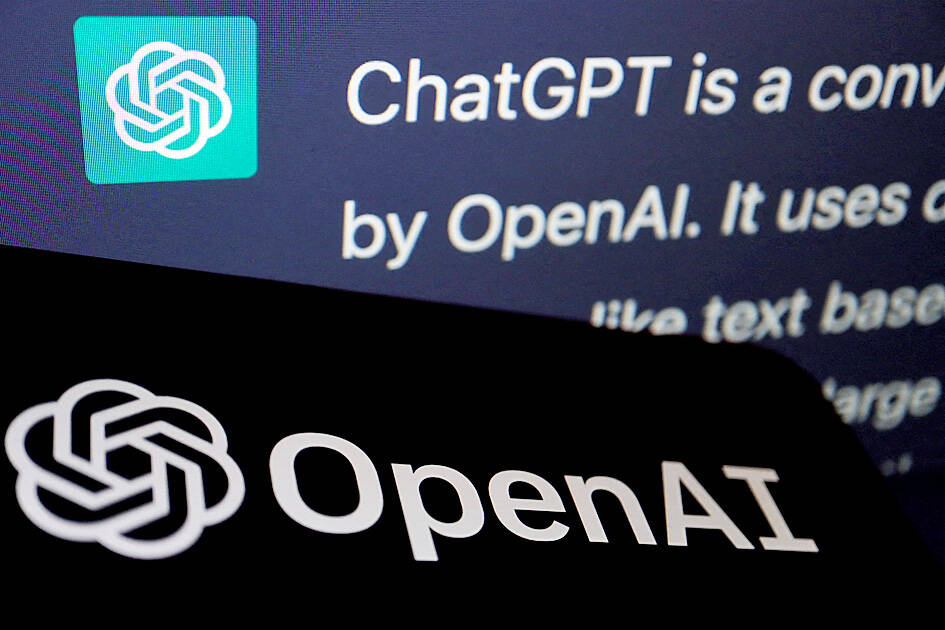OpenAI, the start-up behind ChatGPT, on Thursday said that it is developing an upgrade to its viral chatbot that users can customize as it works to address concerns about bias in artificial intelligence (AI).
The San Francisco-based start-up, which Microsoft Corp has funded and used to power its latest technology, said it has worked to mitigate political and other biases, but also wanted to accommodate more diverse views.
“This will mean allowing system outputs that other people [ourselves included] may strongly disagree with,” it said in a blog post, offering customization as a way forward.

Photo: Reuters
Still, there will “always be some bounds on system behavior,” it said.
ChatGPT, released in November last year, has sparked frenzied interest in the technology behind it called generative AI, which is used to produce answers mimicking human speech that have dazzled people.
The news from the start-up comes in the same week that some media firms have said that answers from Microsoft’s new Bing search engine, powered by OpenAI, are potentially dangerous and that the technology might not be ready for prime time.
How technology companies set guardrails for this nascent technology is a key focus area for companies in the generative AI space with which they are still wrestling.
Microsoft on Wednesday said that user feedback was helping it to improve Bing before a wider rollout, learning for instance that its AI chatbot can be “provoked” to give responses that the company did not intend.
OpenAI said in the blog post that ChatGPT’s answers are first trained on large text datasets available on the Internet.
As a second step, humans review a smaller dataset, and are given guidelines for what to do in different situations, it said.
For example, in the case that a user requests content that is adult, violent or contains hate speech, the human reviewer should direct ChatGPT to answer with something like: “I can’t answer that,” the company said in an excerpt of its guidelines for the software.
If asked about a controversial topic, the reviewers should allow ChatGPT to answer the question, but offer to describe viewpoints of people and movements, instead of trying to “take the correct viewpoint on these complex topics,” the company said.

Semiconductor business between Taiwan and the US is a “win-win” model for both sides given the high level of complementarity, the government said yesterday responding to tariff threats from US President Donald Trump. Home to the world’s largest contract chipmaker, Taiwan Semiconductor Manufacturing Co (TSMC, 台積電), Taiwan is a key link in the global technology supply chain for companies such as Apple Inc and Nvidia Corp. Trump said on Monday he plans to impose tariffs on imported chips, pharmaceuticals and steel in an effort to get the producers to make them in the US. “Taiwan and the US semiconductor and other technology industries

A start-up in Mexico is trying to help get a handle on one coastal city’s plastic waste problem by converting it into gasoline, diesel and other fuels. With less than 10 percent of the world’s plastics being recycled, Petgas’ idea is that rather than letting discarded plastic become waste, it can become productive again as fuel. Petgas developed a machine in the port city of Boca del Rio that uses pyrolysis, a thermodynamic process that heats plastics in the absence of oxygen, breaking it down to produce gasoline, diesel, kerosene, paraffin and coke. Petgas chief technology officer Carlos Parraguirre Diaz said that in

CHIP WAR: Tariffs on Taiwanese chips would prompt companies to move their factories, but not necessarily to the US, unleashing a ‘global cross-sector tariff war’ US President Donald Trump would “shoot himself in the foot” if he follows through on his recent pledge to impose higher tariffs on Taiwanese and other foreign semiconductors entering the US, analysts said. Trump’s plans to raise tariffs on chips manufactured in Taiwan to as high as 100 percent would backfire, macroeconomist Henry Wu (吳嘉隆) said. He would “shoot himself in the foot,” Wu said on Saturday, as such economic measures would lead Taiwanese chip suppliers to pass on additional costs to their US clients and consumers, and ultimately cause another wave of inflation. Trump has claimed that Taiwan took up to

SMALL AND EFFICIENT: The Chinese AI app’s initial success has spurred worries in the US that its tech giants’ massive AI spending needs re-evaluation, a market strategist said Chinese artificial intelligence (AI) start-up DeepSeek’s (深度求索) eponymous AI assistant rocketed to the top of Apple Inc’s iPhone download charts, stirring doubts in Silicon Valley about the strength of the US’ technological dominance. The app’s underlying AI model is widely seen as competitive with OpenAI and Meta Platforms Inc’s latest. Its claim that it cost much less to train and develop triggered share moves across Asia’s supply chain. Chinese tech firms linked to DeepSeek, such as Iflytek Co (科大訊飛), surged yesterday, while chipmaking tool makers like Advantest Corp slumped on the potential threat to demand for Nvidia Corp’s AI accelerators. US stock